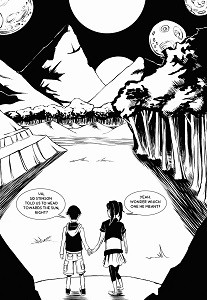
Growing up different is no easy task.
For Bruce and Violet Wong, protagonists of Lloyd Suh’s The Wong Kids in the Secret of the Space Chupacabra Go!, it is an especially complicated endeavor that involves traversing galaxies made up of equal parts Daniel Pinkwater and The Phantom Tollbooth; learning to harness supernatural powers à la X-Men; Karate Kid training montages; befriending a dragon; levitating rocks; confronting loneliness; and a little thing called saving the universe.
“A little bit of everything is in there,” Suh says. “My wife works in children’s literature, a world that I’m really interested in. I remember really fondly all those books from my childhood.” Laughing, he adds, “I knew Peter and Ralph were thinking about doing something, and I was lucky enough to insert myself into their conversation.”
Peter and Ralph are two artistic directors: Peter Brosius at Children’s Theater Company in Minneapolis, and Ralph Peña at New York City’s Ma-Yi Theater Company. In a commissioned co-production, Peña will direct The Wong Kids Oct. 8–Nov, 17 in Minneapolis, then at La MaMa in New York Jan. 28–Feb. 16.
Brosius, whose ambitious commissions for CTC have included pieces by Taylor Mac, Melissa James Gibson and the Civilians, says he “wanted to find theatres to partner with on the creation of new work who were deeply ingrained in and expressive of particular communities.” Ma-Yi, with its dedication to developing and producing new works by Asian-American writers, fit the bill. “I found Ralph to be a fearless artistic director who was deeply committed to new work and authentic voices,” Brosius says.
One of those voices was Suh, a member of Ma-Yi’s Writers Lab since 2004, and the author of such plays as Jesus in India and American Hwangap. “What was exciting for us,” Brosius says, “was that Lloyd was interested in issues of identity being part of the mix, in the soup. His writing handles identity in a way that’s oblique, poetic and surprising.”
Suh agrees, saying that while he finds “storytelling that’s about directly addressing identity” to be “incredibly valuable and rich, it’s just not something I’m personally good at doing.” This reflects Suh’s experience: “As an Asian kid growing up, you’re not constantly walking around and talking about the fact that you’re Asian. It just is. So I wanted to let it just be. Their last name is Wong. They’re going to be played by Asian actors. That does a lot of work.”
For Suh and The Wong Kids, difference is a universal theme that has particularities in the Asian-American experience: Being Chinese American is a source rather than the source of their loneliness. “When you’re an adolescent, anything that feels like an obstacle to finding where you belong is going to get compounded, but not belonging is never about just one thing. The journey of the play is about owning your own uniqueness in order to create where you belong, rather than altering who you are to find where you belong. There’s a strain in storytelling of, ‘It’s okay to be different.’ I was trying to say, ‘It’s not just okay. It’s necessary. And it’s awesome.’”

